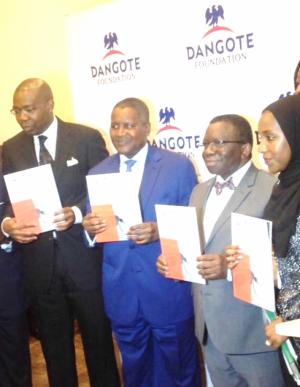Federal Ministry of Health engages private sector to control malaria in Nigeria
Lagos, 15 November 2016 - The Federal Ministry of Health (FMOH), in collaboration with Dangote Foundation launched the Private Sector Engagement Strategy (PSES) for Malaria on 14 November 2016 in Lagos to hasten the attainment of the national malaria control goal.
The PSES was developed to highlight key milestones and chart the roadmap towards private sector involvement in malaria control in Nigeria. It was primarily designed to leverage on the efficiencies and innovations that are prevalent within the diverse private sector while capitalizing on the strength of government to drive the process.
The Minister of Health, Professor Isaac Adewole, in a keynote address at the launch, disclosed that over 90 million Long Lasting Insecticide Nets (LLINs) distributed through campaigns in Nigeria, created a huge opportunity for local productions with resultant boost in the nation’s economic indices.
Equally, Professor Adewole noted that with a population of about 180 million, Nigeria needs a minimum of 30 million nets annually to sustain universal coverage. He therefore stated that private sector engagement in the malaria control can only culminate in a ‘win-win’ situation. The minister further noted that investing in the fight against malaria will boost productivity, reduce absenteeism and increase the GDP.
It is estimated that Nigeria loses about 1.1 billion US dollars every year due to malaria-related absenteeism, loss of productivity and treatment costs; this negatively impacts the nation’s economy which translate into deterioration of human capital, savings, investments and tax revenues.
Dr Lynda Ozor, representing the World Health Organization Country Representative in Nigeria at the launch noted that the investments and sustained financing through private sector partnership with government will accelerate actions towards achievement of the malaria national goals. According to her “statistics show that malaria accounts for about 60% hospital attendance and Nigeria recorded over a quarter of global burden of the disease”.
Pursuant to the broad objective of the partnership, Dr Ozor reminded the government and private sector alliance that ”gains that could accrue from the partnership will be invaluable to the national conntrol goal with sustained efforts, which would also shift the country’s ranking which currently shows that Nigeria accounts for a quarter of the global burden of the disease”.
Making clear the position of the private sector, the founder of the private sector health alliance and National Malaria Ambassador, Alhaji Aliko Dangote, who has supported Nigeria in mobilizing resources for health, including through innovations such as Save One Million Lives Funds, applauded government and international agencies for investing heavily in the fight against the malaria scourge. Notably, he observed that malaria-related costs to the economy is unacceptably high.
Alhaji Dangote who is also the chairman of the Dangote conglomerate, stressed that there are enormous opportunities within the private sector to fight malaria; ranging from mobilizing domestic resources, showcasing innovations, production and advocacy through various advertising media. The cumulative effect of all the activities according to him, should be used to crystalize progress towards the malaria control agenda.
He revealed that over 15 private sector groups have signed a landmark joint commitment declaration to complement government effort and called on other private sector actors at varying levels of the production chain to support the campaign against malaria in Nigeria.
The business mogul added that he will advocate for increased fiscal commitment towards addressing the financing gap, by joining Mr Bill Gates and Ray Chambers in the end malaria campaign which will be inaugurated in New York.
During the launch, Panel discussions involving private sector health alliance, chief executives of Bank of Industry, Hygeia Nigeria, Exxon Mobil, World Bank, Total Health Trust Limited as well as the Healthcare Federation of Nigeria elaborated the importance of private sector engagement and the need to ensure strong partnership with FMOH in the fight against malaria.
Additionally, they highlighted health insurance as a key area for collaboration, noting that companies and organizations can ensure that malaria financing can be included as part of their corporate social responsibility. They also emphasized the need for corporate and private sector to use available channels to reach more people with malaria messaging, increase local production of antimalarial commodities and shape the demand and supply for commodities.
________________________________________
For more information, please contact:
Technical contact:
Dr Lynda Ozor; Tel: +234 803 402 0832; Email: ozorl [at] who.int
Media contact:
Ms Charity Warigon; Tel: +234 810 221 0093; Email: %20%20%20%20warigonc [at] who.int ( warigonc[at]who[dot]int)



